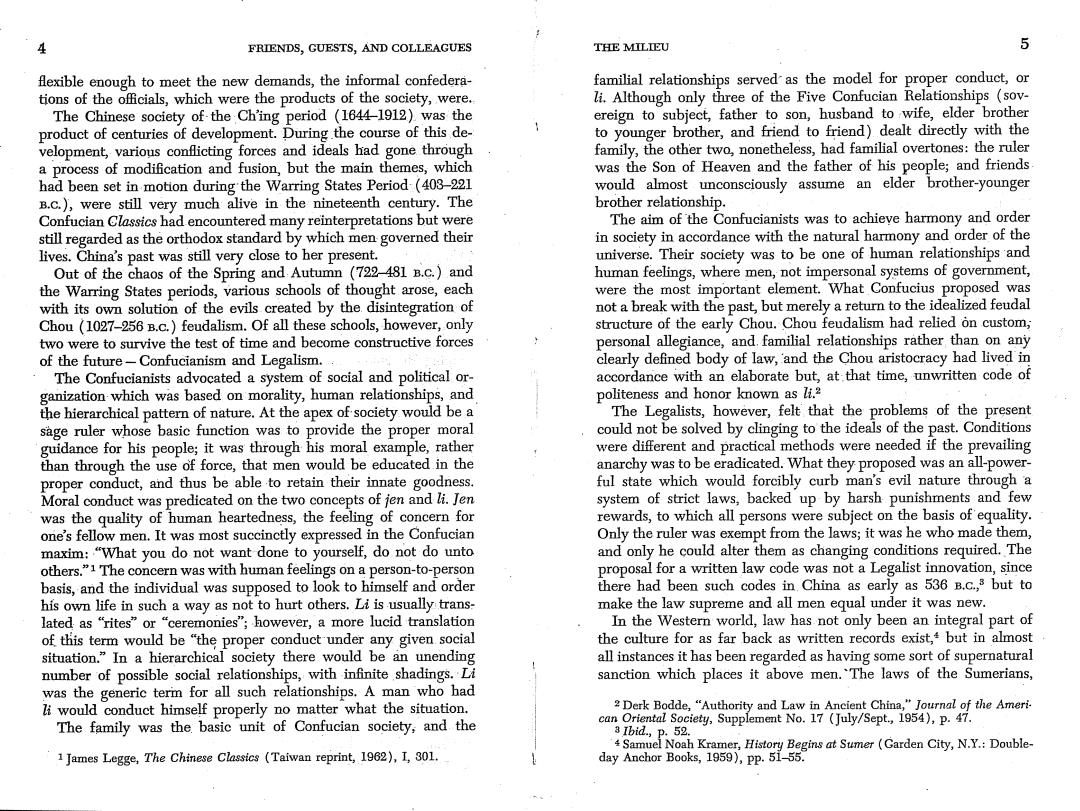
4 FRIENDS,GUESTS,AND COLLEAGUES THE MILIEU 5 flexible enough to meet the new demands,the informal confedera- familial relationships served as the model for proper conduct,or tions of the officials,which were the products of the society,were. li.Although only three of the Five Confucian Relationships (sov- The Chinese society of the Ch'ing period (1644-1912)was the ereign to subject,father to son,husband to wife,elder brother product of centuries of development.During the course of this de- to younger brother,and friend to friend)dealt directly with the velopment,various conflicting forces and ideals had gone through family,the other two,nonetheless,had familial overtones:the ruler a process of modification and fusion,but the main themes,which was the Son of Heaven and the father of his people;and friends had been set in motion during the Warring States Period(403-221 would almost unconsciously assume an elder brother-younger B.c.),were still very much alive in the nineteenth century.The brother relationship. Confucian Classics had encountered many reinterpretations but were The aim of the Confucianists was to achieve harmony and order still regarded as the orthodox standard by which men governed their in society in accordance with the natural harmony and order of the lives.China's past was still very close to her present. universe.Their society was to be one of human relationships 'and Out of the chaos of the Spring and Autumn (722-481 B.c.and human feelings,where men,not impersonal systems of government, the Warring States periods,various schools of thought arose,each were the most important element.What Confucius proposed was with its own solution of the evils created by the disintegration of not a break with the past,but merely a return to the idealized feudal Chou (1027-256 B.c.)feudalism.Of all these schools,however,only structure of the early Chou.Chou feudalism had relied on custom; two were to survive the test of time and become constructive forces personal allegiance,and.familial relationships rather than on any of the future-Confucianism and Legalism. clearly defined body of law,'and the Chou aristocracy had lived in The Confucianists advocated a system of social and political or- accordance with an elaborate but,at that time,unwritten code of ganization which was based on morality,human relationships,and politeness and honor known as li.2 the hierarchical pattern of nature.At the apex of society would be a The Legalists,however,felt that the problems of the present sage ruler whose basic function was to provide the proper moral could not be solved by clinging to the ideals of the past.Conditions guidance for his people;it was through his moral example,rather were different and practical methods were needed if the prevailing than through the use of force,that men would be educated in the anarchy was to be eradicated.What they proposed was an all-power- proper conduct,and thus be able to retain their innate goodness. ful state which would forcibly curb man's evil nature through a Moral conduct was predicated on the two concepts of jen and li.Jen system of strict laws,backed up by harsh punishments and few was the quality of human heartedness,the feeling of concern for rewards,to which all persons were subject on the basis of equality. one's fellow men.It was most succinctly expressed in the Confucian Only the ruler was exempt from the laws;it was he who made them, maxim:"What you do not want done to yourself,do not do unto and only he could alter them as changing conditions required.The others."1 The concern was with human feelings on a person-to-person proposal for a written law code was not a Legalist innovation,since basis,and the individual was supposed to look to himself and order there had been such codes in.China as early as 536 B.c.,3 but to his own life in such a way as not to hurt others.Li is usually trans- make the law supreme and all men equal under it was new. lated as“rites”or“ceremonies'”;however,a more lucid t女anslation In the Western world,law has not only been an integral part of of this term would be "the proper conduct under any given social the culture for as far back as written records exist,+but in almost situation."In a hierarchical society there would be an unending all instances it has been regarded as having some sort of supernatural number of possible social relationships,with infinite shadings.Li sanction which places it above men.The laws of the Sumerians, was the generic term for all such relationships.A man who had li would conduct himself properly no matter what the situation. 2 Derk Bodde,"Authority and Law in Ancient China,"Journal of the Ameri. The family was the basic unit of Confucian society,and the can Oriental Society,Supplement No.17 (July/Sept.,1954),p.47. 3 Ibid.,p.52. 4 Samuel Noah Kramer,History Begins at Sumer(Garden City,N.Y.:Double- 1 James Legge,The Chinese Classics (Taiwan reprint,1962),I,301. day Anchor Books,1959),pp.51-55
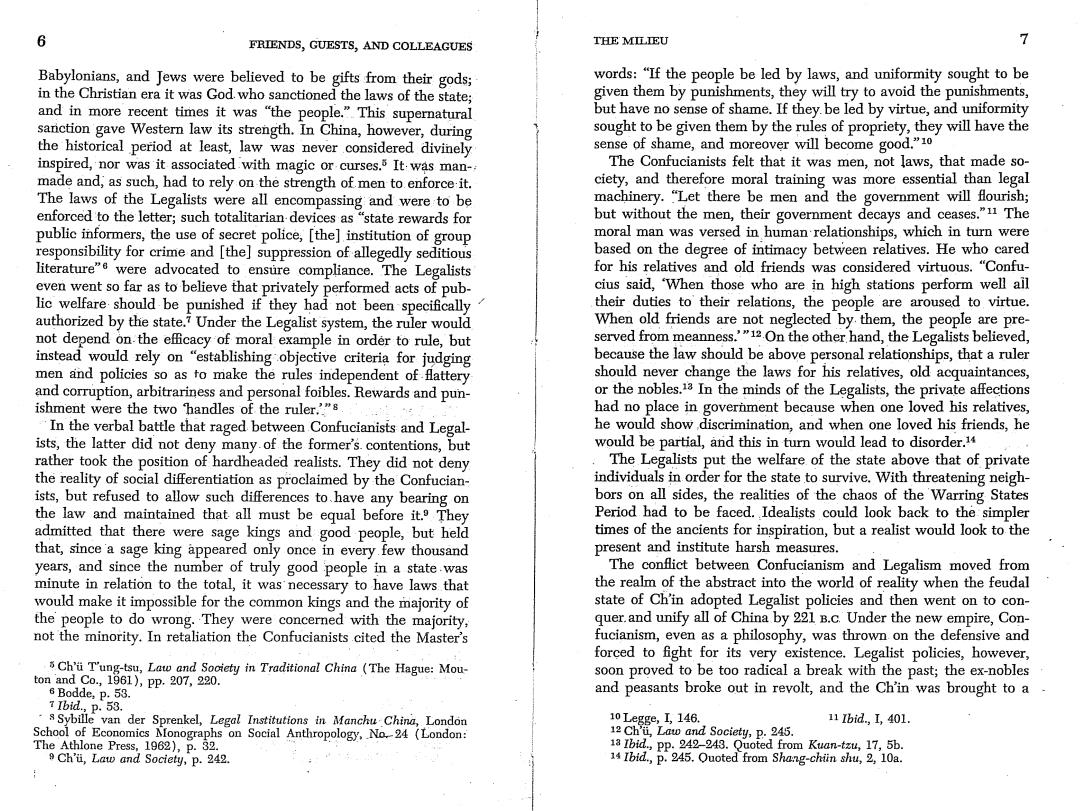
6 FRIENDS,GUESTS,AND COLLEAGUES THE MILIEU 7 Babylonians,and Jews were believed to be gifts from their gods; words:"If the people be led by laws,and uniformity sought to be in the Christian era it was God.who sanctioned the laws of the state; given them by punishments,they will try to avoid the punishments, and in more recent times it was "the people."This supernatural but have no sense of shame.If they.be led by virtue,and uniformity sanction gave Western law its strength.In China,however,during sought to be given them by the rules of propriety,they will have the the historical period at least,law was never considered divinely sense of shame,and moreover will become good."10 inspired,nor was it associated with magic or curses.5 It was man-. The Confucianists felt that it was men,not laws,that made so- made and,as such,had to rely on the strength of men to enforce it. ciety,and therefore moral training was more essential than legal The laws of the Legalists were all encompassing and were to be machinery."Let there be men and the government will flourish; enforced to the letter;such totalitarian devices as "state rewards for but without the men,their government decays and ceases."11 The public informers,the use of secret police,[the]institution of group moral man was versed in human relationships,which in turn were responsibility for crime and [the]suppression of allegedly seditious based on the degree of intimacy between relatives.He who cared literature"e were advocated to ensure compliance.The Legalists for his relatives and old friends was considered virtuous."Confu- even went so far as to believe that privately performed acts of pub- cius said,'When those who are in high stations perform well ail lic welfare should be punished if they had not been specifically their duties to their relations,the people are aroused to virtue. authorized by the state.7 Under the Legalist system,the ruler would When old friends are not neglected by.them,the people are pre- not depend on the efficacy of moral example in order to rule,but served from meanness."On the other hand,the Legalists believed, instead would rely on"establishing objective criteria for judging because the law should be above personal relationships,that a ruler men and policies so as to make the rules independent of flattery should never change the laws for his relatives,old acquaintances, and corruption,arbitrariness and personal foibles.Rewards and pun- or the nobles.1a In the minds of the Legalists,the private affections ishment were the two handles of the ruler."s had no place in government because when one loved his relatives, In the verbal battle that raged between Confucianists and Legal- he would show discrimination,and when one loved his friends,he ists,the latter did not deny many.of the former's.contentions,but would be partial,and this in turn would lead to disorder.4 rather took the position of hardheaded realists.They did not deny The Legalists put the welfare of the state above that of private the reality of social differentiation as proclaimed by the Confucian- individuals in order for the state to survive.With threatening neigh- ists,but refused to allow such differences to.have any bearing on bors on all sides,the realities of the chaos of the Warring States the law and maintained that all must be equal before it.They Period had to be faced.Idealists could look back to the simpler admitted that there were sage kings and good people,but held times of the ancients for inspiration,but a realist would look to the that,since a sage king appeared only once in every few thousand present and institute harsh measures. years,and since the number of truly good people in a state was The conflict between Confucianism and Legalism moved from minute in relation to the total,it was necessary to have laws that the realm of the abstract into the world of reality when the feudal would make it impossible for the common kings and the majority of state of Ch'in adopted Legalist policies and then went on to con- the people to do wrong.They were concerned with the majority, quer.and unify all of China by 221 B.c.Under the new empire,Con- not the minority.In retaliation the Confucianists cited the Master's fucianism,even as a philosophy,was thrown on the defensive and forced to fight for its very existence.Legalist policies,however, Ch'ui T'ung-tsu,Law and Society in Traditional China (The Hague:Mou- soon proved to be too radical a break with the past;the ex-nobles ton and Co.,1961),pp.207,220. 6 Bodde,p.53. and peasants broke out in revolt,and the Ch'in was brought to a 7 Ibid.,p.53. s Sybille van der Sprenkel,Legal Institutions in Manchu China,London 10 Legge,I,146. 11Ibid,L,401. School of Economics Monographs on Social Anthropology,No.24 (London: 12 Ch'i,Law and Society,p.245. The Athlone Press,1962),p.32. 13 Ibid.,pp.242-243.Quoted from Kuan-tzu,17,5b. Ch'ti,Law and Society,p.242. 14 Ibid.,p.245.Ouoted from Shang-chiin shu,2,10a
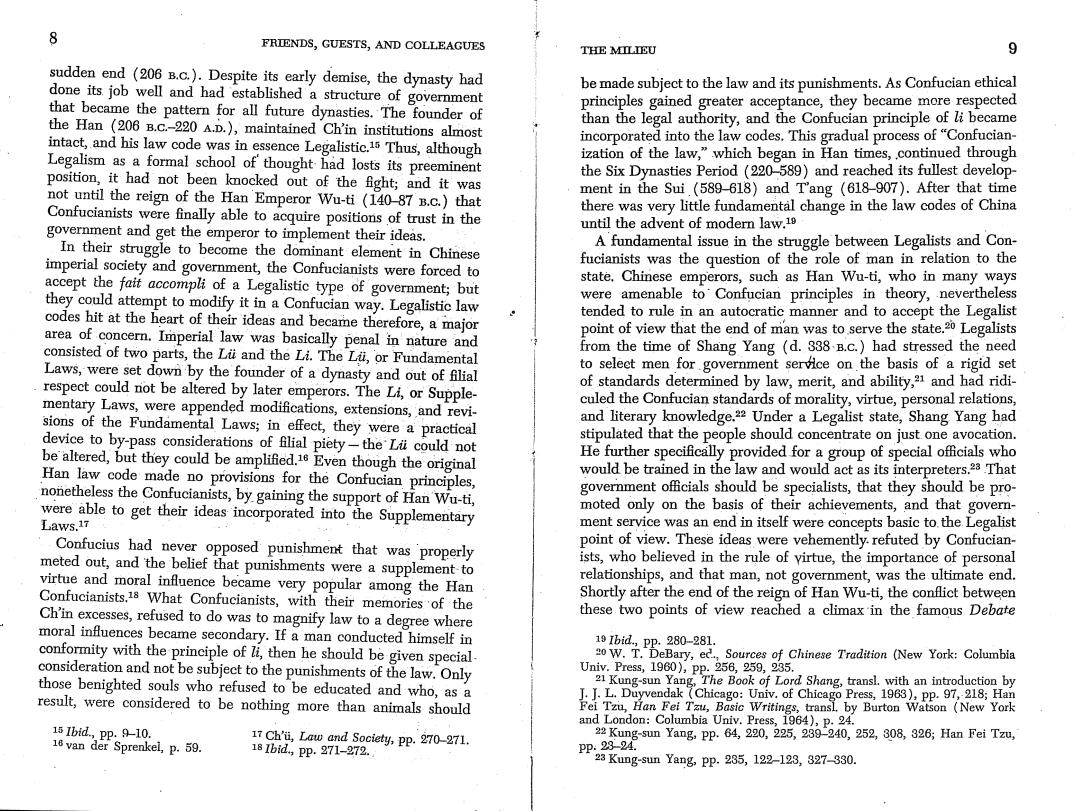
8 FRIENDS,GUESTS,AND COLLEAGUES THE3MⅡEU 9 sudden end (206 B.c.).Despite its early demise,the dynasty had done its job well and had established a structure of government be made subject to the law and its punishments.As Confucian ethical that became the pattern for all future dynasties.The founder of principles gained greater acceptance,they became more respected the Han (206 B.C.-220 A.D.),maintained Ch'in institutions almost than the legal authority,and the Confucian principle of li became intact,and his law code was in essence Legalistic.15 Thus,although incorporated into the law codes.This gradual process of "Confucian- Legalism as a formal school of thought had losts its preeminent ization of the law,"which began in Han times,.continued through position,it had not been knocked out of the fight;and it was the Six Dynasties Period(220-589)and reached its fullest develop- not until the reign of the Han Emperor Wu-ti (140-87 B.c.)that ment in the Sui.(589-618)and T'ang (618-907).After that time Confucianists were finally able to acquire positions of trust in the there was very little fundamental change in the law codes of China government and get the emperor to implement their ideas. until the advent of modern law.19 In their struggle to become the dominant element in Chinese A fundamental issue in the struggle between Legalists and Con- imperial society and government,the Confucianists were forced to fucianists was the question of the role of man in relation to the accept the fait accompli of a Legalistic type of government;but state.Chinese emperors,such as Han Wu-ti,who in many ways they could attempt to modify it in a Confucian way.Legalistic law were amenable to Confucian principles in theory,nevertheless codes hit at the heart of their ideas and became therefore,a major tended to rule in an autocratic manner and to accept the Legalist area of concern.Imperial law was basically penal in nature and point of view that the end of man was to serve the state.20 Legalists consisted of two parts,the Lii and the Li.The Lu,or Fundamental from the time of Shang Yang (d.338 B.c.)had stressed the need Laws,were set down by the founder of a dynasty and out of filial to seleet men for.government service on the basis of a rigid set respect could not be altered by later emperors.The Li,or Supple- of standards determined by law,merit,and ability,21 and had ridi- mentary Laws,were appended modifications,extensions,and revi- culed the Confucian standards of morality,virtue,personal relations, sions of the Fundamental Laws;in effect,they were a practical and literary knowledge.22 Under a Legalist state,Shang Yang had device to by-pass considerations of filial piety-the Lii could not stipulated that the people should concentrate on just one avocation. be altered,but they could be amplified.16 Even though the original He further specifically provided for a group of special oficials who Han law code made no provisions for the Confucian principles, would be trained in the law and would act as its interpreters.28 That nonetheless the Confucianists,by gaining the support of Han Wu-ti, government officials should be specialists,that they should be pro- were able to get their ideas incorporated into the Supplementary moted only on the basis of their achievements,and that govern- Laws.17 ment service was an end in itself were concepts basic to.the Legalist Confucius had never opposed punishment that was properly point of view.These ideas were vehemently.refuted by Confucian- meted out,and the belief that punishments were a supplement-to ists,who believed in the rule of yirtue,the importance of personal virtue and moral influence became very popular among the Han relationships,and that man,not government,was the ultimate end. Confucianists.18 What Confucianists,with their memories of the Shortly after the end of the reign of Han Wu-ti,the conflict between Ch'in excesses,refused to do was to magnify law to a degree where these two points of view reached a climax in the famous Debate moral influences became secondary.If a man conducted himself in conformity with the principle of li,then he should be given special 19Ibd,Pp.280-281 20 W.T.DeBary,ed.,Sources of Chinese Tradition (New York:Columbia consideration and not be subject to the punishments of the law.Only Univ.Press,1960),PP.256,259,235. those benighted souls who refused to be educated and who,as a 21 Kung-sun Yang,The Book of Lord Shang,transl.with an introduction by result,were considered to be nothing more than animals should J.J.L.Duyvendak (Chicago:Univ.of Chicago Press,1963),pp.97,218;Han Fei Tzu,Han Fei Tzu,Basic Writings,transl.by Burton Watson (New York and London:Columbia Univ.Press,1964),p.24. 15Ibd,pp.9-10. 16 van der Sprenkel,p.59. 17 Ch'ii,Law and Society,pp.270-271. 22Kung-sun Yang.Pp.64,220,225,239-240,252,308,326;Han Fei Tzu, 18Ibd,Pp.271-272. Pp:2324 23Kung-sun Yang,Pp.235,122-123327-330
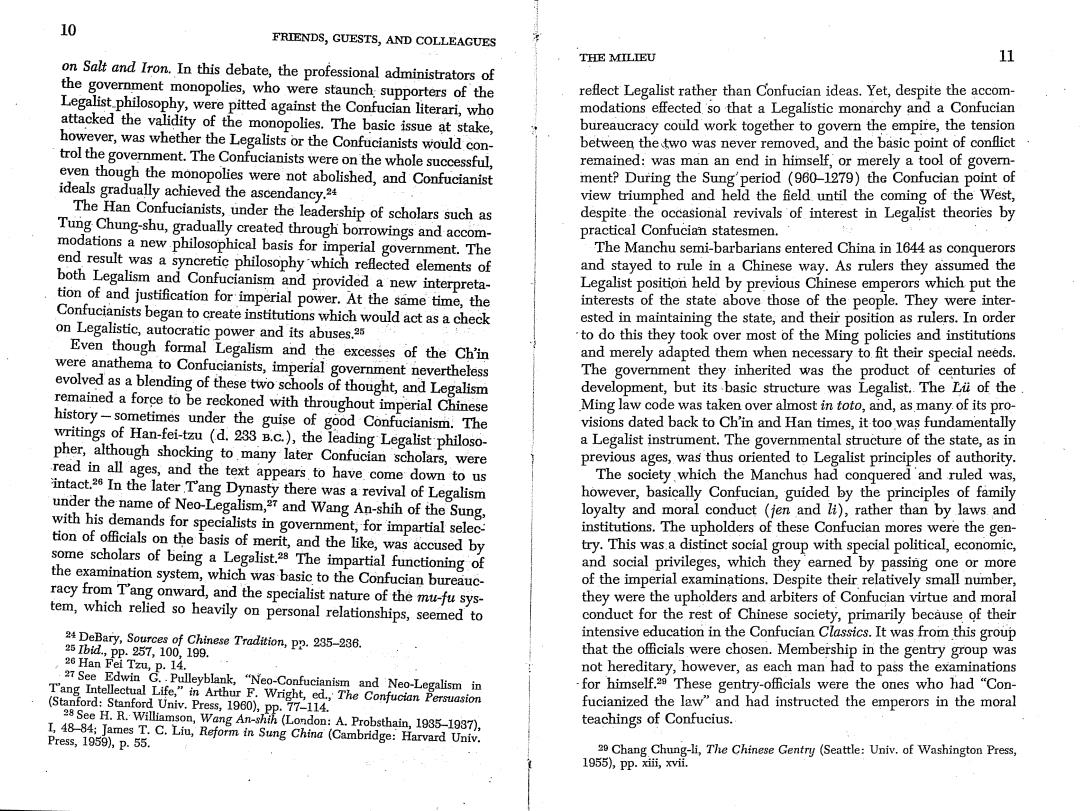
10 FRIENDS,GUESTS,AND COLLEAGUES THE MILIEU 11 on Salt and Iron.In this debate,the professional administrators of the government monopolies,who were staunch.supporters of the reflect Legalist rather than Confucian ideas.Yet,despite the accom- Legalist philosophy,were pitted against the Confucian literari,who modations effected so that a Legalistic monarchy and a Confucian attacked the validity of the monopolies.The basic issue at stake, bureaucracy could work together to govern the empire,the tension however,was whether the Legalists or the Confucianists would con- between the two was never removed,and the basic point of conflict trol the government.The Confucianists were on the whole successful, remained:was man an end in himself,or merely a tool of govern- even though the monopolies were not abolished,and Confucianist ment?During the Sung period(960-1279)the Confucian point of ideals gradually achieved the ascendancy.24 view triumphed and held the field until the coming of the West, The Han Confucianists,under the leadership of scholars such as despite the occasional revivals of interest in Legalist theories by Tung Chung-shu,gradually created through borrowings and accom- practical Confucian statesmen. modations a new philosophical basis for imperial government.The The Manchu semi-barbarians entered China in 1644 as conquerors end result was a syncretic philosophy which reflected elements of and stayed to rule in a Chinese way.As rulers they assumed the both Legalism and Confucianism and provided a new interpreta- tion of and justification for imperial power.At the same time,the Legalist position held by previous Chinese emperors which put the interests of the state above those of the people.They were inter- Confucianists began to create institutions which would act as a check ested in maintaining the state,and their position as rulers.In order on Legalistic,autocratic power and its abuses.35 to do this they took over most of the Ming policies and institutions Even though formal Legalism and the excesses of the Ch'in were anathema to Confucianists,imperial government nevertheless and merely adapted them when necessary to fit their special needs. evolved as a blending of these two schools of thought,and Legalism The government they inherited was the product of centuries of development,but its basic structure was Legalist.The Lii of the remained a force to be reckoned with throughout imperial Chinese Ming law code was taken over almost in toto,and,as many.of its pro- history-sometimes under the guise of good Confucianism.The visions dated back to Ch'in and Han times,it too was fundamentally writings of Han-fei-tzu(d.233 B.c.),the leading Legalist philoso- a Legalist instrument.The governmental structure of the state,as in pher,although shocking to many later Confucian scholars,were previous ages,was thus oriented to Legalist principles of authority. read in all ages,and the text appears to have come down to us The society which the Manchus had conquered and ruled was, intact.26 In the later T'ang Dynasty there was a revival of Legalism under the name of Neo-Legalism,37 and Wang An-shih of the Sung, however,basically Confucian,guided by the principles of family loyalty and moral conduct (jen and li),rather than by laws and with his demands for specialists in government,for impartial selec- institutions.The upholders of these Confucian mores were the gen- tion of officials on the basis of merit,and the like,was accused by some scholars of being a Legalist.28 The impartial functioning of try.This was a distinct social group with special political,economic, the examination system,which was basic to the Confucian bureauc- and social privileges,which they earned by passing one or more of the imperial examinations.Despite their relatively small number, racy from T'ang onward,and the specialist nature of the mu-fu sys- they were the upholders and arbiters of Confucian virtue and moral tem,which relied so heavily on personal relationships,seemed to conduct for the rest of Chinese society,primarily because of their 24 DeBary,Sources of Chinese Tradition,pp.235-236. intensive education in the Confucian Classics.It was from this group 25Ibid,Pp.257,100,199. that the officials were chosen.Membership in the gentry group was 20 Han Fei Tzu,p.14. 27 See Edwin G..Pulleyblank,"Neo-Confucianism and Neo-Legalism in not hereditary,however,as each man had to pass the examinations T'ang Intellectual Life,"in Arthur F.Wright,ed.,The Confucian Persuasion for himself.2 These gentry-officials were the ones who had"Con- (Stanford:Stanford Univ.Press,1960),pp.77-114. fucianized the law"and had instructed the emperors in the moral 28 See H.R.Williamson,Wang An-shih (London:A.Probsthain,1935-1937), teachings of Confucius. I,48-84;James T.C.Liu,Reform in Sung China (Cambridge:Harvard Univ. Press,,1959),p.55. 2 Chang Chung-li,The Chinese Gentry(Seattle:Univ.of Washington Press, 1955),pp.xiii,xvii
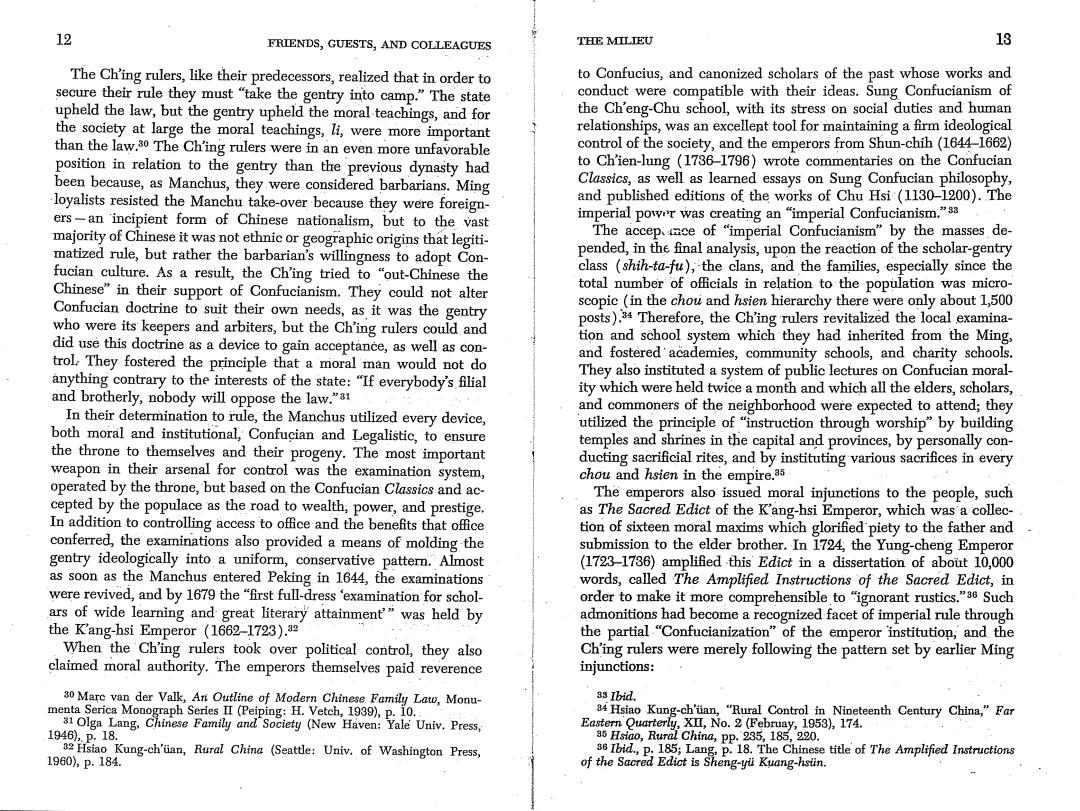
12 FRIENDS,GUESTS,AND COLLEAGUES THE MILIEU 13 The Ch'ing rulers,like their predecessors,realized that in order to to Confucius,and canonized scholars of the past whose works and secure their rule they must "take the gentry into camp."The state conduct were compatible with their ideas.Sung Confucianism of upheld the law,but the gentry upheld the moral teachings,and for the Ch'eng-Chu school,with its stress on social duties and human the society at large the moral teachings,li,were more important relationships,was an excellent tool for maintaining a firm ideological than the law.30 The Ch'ing rulers were in an even more unfavorable control of the society,and the emperors from Shun-chih(1644-1662) position in relation to the gentry than the previous dynasty had to Ch'ien-lung (1736-1796)wrote commentaries on the Confucian been because,as Manchus,they were considered barbarians.Ming Classics,as well as learned essays on Sung Confucian philosophy, loyalists resisted the Manchu take-over because they were foreign- and published editions of the works of Chu Hsi(1130-1200).The ers-an incipient form of Chinese nationalism,but to the vast imperial pow.r was creating an "imperial Confucianism."s majority of Chinese it was not ethnic or geographic origins that legiti- The accep.ce of "imperial Confucianism"by the masses de- matized rule,but rather the barbarian's willingness to adopt Con- pended,in the final analysis,upon the reaction of the scholar-gentry fucian culture.As a result,the Ch'ing tried to "out-Chinese the class (shih-ta-fu),the clans,and the families,especially since the Chinese"in their support of Confucianism.They could not alter total number of officials in relation to the population was micro- Confucian doctrine to suit their own needs,as it was the gentry scopic (in the chou and hsien hierarchy there were only about 1,500 who were its keepers and arbiters,but the Ch'ing rulers could and posts).34 Therefore,the Ch'ing rulers revitalized the local examina- did use this doctrine as a device to gain acceptance,as well as con- tion and school system which they had inherited from the Ming, trol,They fostered the principle that a moral man would not do and fostered'academies,community schools,and charity schools. anything contrary to the interests of the state:"If everybody's filial They also instituted a system of public lectures on Confucian moral- and brotherly,nobody will oppose the law."a ity which were held twice a month and which all the elders,scholars, In their determination to rule,the Manchus utilized every device, and commoners of the neighborhood were expected to attend;they both moral and institutional,Confucian and Legalistic,to ensure utilized the principle of"instruction through worship"by building the throne to themselves and their progeny.The most important temples and shrines in the capital and provinces,by personally con- ducting sacrificial rites,and by instituting various sacrifices in every weapon in their arsenal for control was the examination system, chou and hsien in the empire.35 operated by the throne,but based on the Confucian Classics and ac- The emperors also issued moral injunctions to the people,such cepted by the populace as the road to wealth,power,and prestige. as The Sacred Edict of the K'ang-hsi Emperor,which was a collec- In addition to controlling access to office and the benefits that office tion of sixteen moral maxims which glorified piety to the father and conferred,the examinations also provided a means of molding the submission to the elder brother.In 1724,the Yung-cheng Emperor gentry ideologically into a uniform,conservative pattern.Almost (1723-1736)amplified this Edict in a dissertation of about 10,000 as soon as the Manchus entered Peking in 1644,the examinations words,called The Amplified Instructions of the Sacred Edict,in were revived,and by 1679 the "first full-dress 'examination for schol- order to make it more comprehensible to "ignorant rustics."Such ars of wide learning and great literary attainment'"was held by admonitions had become a recognized facet of imperial rule through the K'ang-hsi Emperor (1662-1723).32 the partial"Confucianization"of the emperor institution,and the When the Ch'ing rulers took over political control,they also Ch'ing rulers were merely following the pattern set by earlier Ming claimed moral authority.The emperors themselves paid reverence injunctions: 30 Mare van der Valk,An Outline of Modern Chinese Family Law,Monu- s3 Ibid. menta Serica Monograph Series II(Peiping:H.Vetch,1939),p.10. 84 Hsiao Kung-ch'tian,"Rural Control in Nineteenth Century China,"Far 31 Olga Lang,Chinese Family and Society (New Haven:Yale Univ.Press, Eastern Quarterly,XII,No.2 (Februay,1953),174. 1946),p.18. 35 Hsiao,Rural China,pp.235,185,220. 32 Hsiao Kung-ch'tian,Rural China (Seattle:Univ.of Washington Press, s6 Ibid.,p.185;Lang,p.18.The Chinese title of The Amplified Instructions 1960),P.184. of the Sacred Edict is Sheng-yii Kuang-hstin